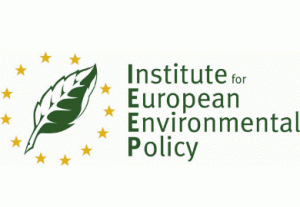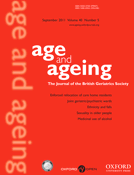 The Institute for European Environmental Policy (IEEP)has published a report on what the implications of Horizon 2020 on research into environmental issues. In the report, they express concerns over the lack of attention given to biodiversity in particular, also resource efficiency and suggest that the scale of funding proposed for infrastructure projects is likely to have adverse effects on the environment.
The Institute for European Environmental Policy (IEEP)has published a report on what the implications of Horizon 2020 on research into environmental issues. In the report, they express concerns over the lack of attention given to biodiversity in particular, also resource efficiency and suggest that the scale of funding proposed for infrastructure projects is likely to have adverse effects on the environment.
/ Full archive
It’s official – FP7 has competetive success rates
 FP7 has unfairly gained a reputation as being extremely difficult to obtain. The latest figures released from the EC show that FP7 actually had a success rate of 21% last year (a massive €3.9 billion of research funding was distributed through 63 calls for proposals). Our recent blogpost on Research Councils show that the EC is actually higher than many of our home funders.
FP7 has unfairly gained a reputation as being extremely difficult to obtain. The latest figures released from the EC show that FP7 actually had a success rate of 21% last year (a massive €3.9 billion of research funding was distributed through 63 calls for proposals). Our recent blogpost on Research Councils show that the EC is actually higher than many of our home funders.
The statistically greater chance of success, coupled with the added benefits of gaining EU funding as testified by BU academics such as Sherry Jeary and Dimitrios Buhalis shows that we should all be looking to the EU for funding. If you are a BU member of staff and have an idea for EU funding you want to discuss, drop me an email.
Be a part of the Royal Society Summer Science Exhibition
Each year the Royal Society selects teams at the forefront of UK science and technology to showcase their research. The 2012 Summer Science Exhibition will take place from 3 – 8 July 2012; why not submit a proposal to be one of them?

Why exhibit?
- Raise the profile of your research and institution with key influencers, including potential funders, government and the public
- Join the Royal Society in highlighting the importance of scientific research and celebrating cutting edge UK science
- Tap into the Society’s extensive and influential media networks
- Enthuse 2000 secondary school students about science and careers in science
- Engage with over 10,000 members of the public and many more thousands online
- Enhance your communication skills
- Network with other research scientists
- Enjoy yourself!
More information about the Exhibition, including FAQs and the proposal form, can be found at royalsociety.org/how-to-exhibit. The deadline for proposals is Monday 24 October 2011.
Participate in the JISC “Good Data Management Conference” online today
 JISC is live streaming its research integrity conference today 13 September looking specifically at the importance of good research data management. The aim is to bring together the current thinking on effective practice and give senior staff and researchers an opportunity to debate the thornier issues, like whose responsibility this is and how to manage freedom of information requests.
JISC is live streaming its research integrity conference today 13 September looking specifically at the importance of good research data management. The aim is to bring together the current thinking on effective practice and give senior staff and researchers an opportunity to debate the thornier issues, like whose responsibility this is and how to manage freedom of information requests.
You are welcome to participate by submitting questions via twitter by using #jiscres11 or emailing jiscevents@gmail.com, your questions will be put to the panel. You can also watch the keynote speakers live who are:
- Professor David Baker, deputy chair of JISC
- Professor Dave De Roure, professor of e-research, Oxford University e-Research Centre and national strategic director of Digital Social Research
- Professor Sir Tim O’Shea, principal and vice chancellor of University of Edinburgh and chair of JISC
- Professor Kevin Schürer, pro vice chancellor (Research and Enterprise), University of Leicester
- Sarah Porter, JISC’s head of innovation
During the conference you can:
- Learn why research data management matters and who should be responsible for research data management in your organisation
- Read recommended reports and resources as they are referred to by the speakers
- Understand from case studies what success might look like
- Watch key experts describe the routes to successful data management
- Participate on Twitter and ask questions of the speakers using #jiscres11
- View technical requirements for watching live stream via Mediasite
There’s no need to register – simply join online today from 09.45.
How does the UK do in FP7?
 A report recently released by the EC gives facts and figures on participation in FP7, including participant patterns, proposal evaluation assessments, success rates and review times. There is also a special section on Marie Curie actions and an outline of the top university and industry partners.
A report recently released by the EC gives facts and figures on participation in FP7, including participant patterns, proposal evaluation assessments, success rates and review times. There is also a special section on Marie Curie actions and an outline of the top university and industry partners.
Highlights are that under FP7 funding 10, 524 grant agreements have been signed (involving 58, 945 participants), totalling a whopping 18.5 billion Euros.
The UK does well in FP7, representing 13 of the top 50 academic participants, featuring in the top 20 research organisations who participated and 4 of the top 50 industry partners in FP7 are from the UK. In terms of the amount of funding awarded in successful applications, the UK shows we’re not shy in asking for money, ranking second out of the 27 EU Member States.
One man’s experience of the Research Proposal Review Service
 A short while ago Richard Berger, Head of Postgraduate Research for the Media School, submitted a proposal to the Research Proposal Review Service. This is his story…..
A short while ago Richard Berger, Head of Postgraduate Research for the Media School, submitted a proposal to the Research Proposal Review Service. This is his story…..
I recently used RPRS for the first time. It’s a system that’s been running for a while, and before then I used to informally ask colleagues to look over bids I was in the process of putting together. This time however, I used the RPRS for a recent Expression of Interest. Previously, I had always been in a rush to get bids in and felt that I wouldn’t have time to go through a formal peer-review process. But I was wrong.
Despite quite a tight deadline and the fact that this took place in August – when many colleagues and support staff are on leave – the service was very prompt and extremely diligent. I was asked to select some designated reviewers from the Media School, and in a week, I received two comprehensive reviews of my EOI. The comments were extremely useful, and I incorporated most of them into my document. It was clear that both reviewers, and Caroline at the Centre for Research and Enterprise, had read the quite complex (and lengthy!) call for expressions-of-interest – which much have taken some time.
I’ll have to wait and see, but I do feel the process was very worthwhile. Bid-writing is often quite a lonely process, and it’s nice to know that there is now a great deal of support at BU, even in the height of summer. It’s quite difficult to get the balance right between being objective and critical, and being supportive; I think the team at CRE have got it just about right.
So, in future, I will still show work-in-progress to colleagues and friends at BU, but I’ll use the RPRS too, as it’s more formal and doesn’t take as long as you perhaps think it might. Also, your colleagues may not be as critical as RPRS no doubt will be. Being successful at getting research funding will benefit everyone who works at BU in the long-run, as the reputation of our institution increases. So, why not try for yourselves?
To find out more about the RPRS and how we can support your proposal, please contact Caroline O’Kane.
What makes a good impact section?
 In writing an FP7 bid the marks allocated for Impact are the same as those for Science & Technological Excellence. So, how do you make sure you score top marks?
In writing an FP7 bid the marks allocated for Impact are the same as those for Science & Technological Excellence. So, how do you make sure you score top marks?
Beta Technology (sponsored by DEFRA) are the UKs National Contact Point for three of the FP7 themes and offer a number of good tips. They’ve also provided real-life examples of a good and not so good Impact Section together with the evaluators’ mark and feedback – these are essential reading for any propective FP7 applicant!
Impact section examples can be found on the I drive at the following address: \\Lytchett\IntraStore\CRKT\Public\Research Blog Docs\Impact Summary
If you would like more information on the impact advice from Beta Technology please contact Shelly Maskell.
Thinking of submitting to FP7 Energy? There is a free support service available!
The deadline for proposals to the FP7-ENERGY-2012-1 Call is 25th October 2011 and the EU Energy Focus team is providing online support sessions, proposal clinic (one to one meetings of 1 hour with a member of the team to discuss your proposal) and proposal review services prior to the this deadline.
Online support session: This will be held on the key aspects of the preparation of a Stage 1 proposal 3- 4pm on Thursday15th September. The online support session will provide you with a comprehensive and interactive presentation on key aspects of the stage 1 proposal preparation and submission process and an opportunity to ask questions. If you would like to join this session please email and you will be sent the telephone conference call dial in details and the weblink where you will be able to view the slides.
Proposal clinic sessions: These are available in London on Thursday 22nd September. Register your interest in attending a clinic session by emailing a proposal summary. They will then allocate the sessions and inform you of the time for your meeting. If you would like to attend a clinic session but are unable to attend on this date in London they will try to accommodate you on alternative dates or at other locations if this can be arranged.
Proposal review service: This service is available between Monday 3rd October and the proposal deadline. Email to express your interest in this. All proposals will be treated as confidential.
FP7 Marie Curie submissions on the up – but so is the budget!
 The Marie Curie scheme has had a significant increase in submissions over the last year. The Intra-Europe and International Outgoing Fellowship submissions were up 17% on last year and the International Incoming Fellowships had an 11% increase in submissions.
The Marie Curie scheme has had a significant increase in submissions over the last year. The Intra-Europe and International Outgoing Fellowship submissions were up 17% on last year and the International Incoming Fellowships had an 11% increase in submissions.
Don’t be put off applying next year however as the increase in application numbers may be offset by the higher budgets in forthcoming calls. The IEF budget is €15m higher than in 2010 and the IOF and IIF budgets €12m higher.
Evaluation summary reports for the 2011 proposals are expected at the end of November 2011, with final results due in December; I will post these on the blog when they are released.
fEC step by step guide to costing! ~ Step 5 Exceptional costs
 This week is fEC week on the Blog! Each day we have been explaining a different element of fEC as a quick reference guide to help you prepare the budgets for your research proposals. Today is the last in the series and the focus is on Exceptional costs.
This week is fEC week on the Blog! Each day we have been explaining a different element of fEC as a quick reference guide to help you prepare the budgets for your research proposals. Today is the last in the series and the focus is on Exceptional costs.
See Friday’s blog post (Introduction to full economic costing) for an explanation of what fEC actually is and why we use it.
Step 5 – Exceptional costs
For Research Council applications in particular, certain costs will be classified as Exceptional and will be subject to a different funding arrangement to the rest of the costs on the project. These are:
- Postgraduate student fees and stipends
- Equipment costing in excess of £10k
- Large survey fees
Research Councils will usually pay 100% of the fEC of these exceptional costs, with the exception of equipment costing in excess of £10k for which the Research Councils will pay approximately 50-100% of the fEC depending on the total cost of the equipment. For further information, see the RCUK statement on the Changes to Requests for Equipment from 1st May 2011.
Tuition fee and stipend levels for Research Council funded students can be found on the RCUK webpages.
This is the final installment of this week’s step by step guide to fEC. The other steps can be accessed here:
Step 1 – Directly Incurred costs
Step 2 – Estimating staff time
Funding for International Partnering
 RCUK-FAPESP Bilateral Agreement for the International Partnership and Networking Scheme: Under this scheme, bilateral applications which involve international collaborative teams from the UK and the state of Sao Paulo will be considered. The maximum amount of funding available from the ESRC is £25,000. Deadline 12.10.11
RCUK-FAPESP Bilateral Agreement for the International Partnership and Networking Scheme: Under this scheme, bilateral applications which involve international collaborative teams from the UK and the state of Sao Paulo will be considered. The maximum amount of funding available from the ESRC is £25,000. Deadline 12.10.11
EC Cooperation Projects with Third Countries: Grants support cooperation projects aimed at cultural exchanges between the countries taking part in the programme and selected third countries. Funding is worth between €50,000 and €200,000 over a maximum of 24 months. Deadline: 03.05.12
fEC step by step guide to costing! ~ Step 4 Estate and Indirect costs
 This week is fEC week on the Blog! Each day we will be explaining a different element of fEC as a quick reference guide to help you prepare the budgets for your research proposals. Today’s focus is on estate and indirect costs.
This week is fEC week on the Blog! Each day we will be explaining a different element of fEC as a quick reference guide to help you prepare the budgets for your research proposals. Today’s focus is on estate and indirect costs.
See Friday’s blog post (Introduction to full economic costing) for an explanation of what fEC actually is and why we use it to cost projects.
Step 4 – Estate and Indirect costs
There are some major items of expenditure in support of research activities made both by the School and centrally by the University. These costs are important as they ensure that the University has a well-maintained infrastructure and administrative support to enable research and enterprise activities to be carried out. Under fEC these are termed estate costs and indirect costs.
Estate and indirect cost charges replace the previous ‘overhead’ charge that was applied to research projects. Whereas the overhead was a fairly arbitrary charge, the estate and indirect costs are true costs that the University is incurring and are based on the expenditure contained within the audited annual accounts.
The calculation of estate and indirect costs is a mandatory requirement for all UK HEIs, and is done using the same methodology in each institution. The costs that are calculated will be different, but they will have been calculated in a standardised and consistent way.
Estate costs – these provide a share of the cost of providing the physical infrastructure for research, and are calculated by each HEI using its own cost rates.
Indirect costs – these are non-specific costs charged across all projects based on estimates that are not otherwise included as directly allocated costs. Examples of costs included in the indirect cost charge are:
- academic support time not spent on teaching, research or other (as defined by TRAC)
- clerical and technical staff costs
- non-staff costs in academic departments
- staff and non-staff costs in central service departments
- gross cost of capital employed (i.e. restructuring and interest costs and the net COCE)
Estates and indirect costs are driven by the academic/research FTE allocated to the project and will be calculated by the CRE Operations team as part of the costing.
See tomorrow’s blog post on exceptional costs for the final exciting installment of fEC!
Free Cake Today!!
 Today between 11am-1pm the Research Development Unit will be in the Atrium. Drop by for an informal chat and grab yourself a cake.
Today between 11am-1pm the Research Development Unit will be in the Atrium. Drop by for an informal chat and grab yourself a cake.
If you want to know about the new BU internal research funds (the Open Access Publication Fund and the Research Development Fund), the internal peer review service (RPRS), UK, EU and international funding opportunities, the REF, BU’s new research management system, the changes we’re making to RED, Research Professional, the emerging BU Research Themes, publishing and research outputs, in fact anything at all to do with research then now is your chance!
Find out about Dr Samuel Nyman’s research into the psychosocial aspects of falls and their prevention in older people
 Research by Age UK estimates that falls amongst older people in the UK could be costing the NHS in excess of £4.6m a day, with up to one in three people over 65 falling each year. Falls account for over 50% of hospital admissions among the over 70s, with around 14,000 older people dying annually in the UK after a fall. Evidence suggests that if older people regularly take part in exercise specially designed to improve strength and balance then their risk of falls can be cut by up to 55%. Dr Samuel Nyman in the Psychology Research Group (DEC) undertakes research primarily focused on the psychosocial aspects of falls and their prevention in older people, and has a particular interest in helping older people become physically active to prevent falls. His work has focused on how internet-based falls prevention advice can be made more motivating and inspiring for older people, and he was invited as a guest speaker to present his research at Arthritis Research UK’s Musculoskeletal Educators Conference in June 2011.
Research by Age UK estimates that falls amongst older people in the UK could be costing the NHS in excess of £4.6m a day, with up to one in three people over 65 falling each year. Falls account for over 50% of hospital admissions among the over 70s, with around 14,000 older people dying annually in the UK after a fall. Evidence suggests that if older people regularly take part in exercise specially designed to improve strength and balance then their risk of falls can be cut by up to 55%. Dr Samuel Nyman in the Psychology Research Group (DEC) undertakes research primarily focused on the psychosocial aspects of falls and their prevention in older people, and has a particular interest in helping older people become physically active to prevent falls. His work has focused on how internet-based falls prevention advice can be made more motivating and inspiring for older people, and he was invited as a guest speaker to present his research at Arthritis Research UK’s Musculoskeletal Educators Conference in June 2011.
Samuel is part of a multi-disciplinary team of researchers, led by Prof Marcus Ormerod at the University of Salford, who have been awarded funding from the MRC-led cross-council Lifelong Health and Wellbeing programme to conduct a year-long pilot study called: “Go Far (Going Outdoors: Falls, Ageing and Resilience)”. Go Far starts in January 2012 and will investigate the role of the outdoor environment in shaping health inequalities, explore older people’s experiences of falling outdoors, develop and test tools and techniques to evaluate the relationship between at-risk people and the outdoor environment, and develop a clear road map for future cross-disciplinary research in this area. The project will also involve experts from Age UK, the UK Health and Safety Laboratory, and Toronto Rehab.
Working with Dr Claire Ballinger (University of Southampton) and Prof Judith Phillips (Swansea University), Samuel’s contribution will be to explore through focus groups older people’s perceptions of the key risk factors for falling in the outdoor environment. This aspect of the project will lead to an understanding of the environmental risk factors which have yet to be accounted for in the current evidence base. Overall, the project will develop a greater understanding of the many factors involved in outdoor falls and create practical tools which will significantly help older people’s health and wellbeing.
 Prior to this project Samuel undertook a systematic review of older people’s participation in falls prevention interventions. Earlier this year Samuel presented this research at a symposium in Italy for the European Congress of the International Association of Gerontology and Geriatrics, which he also co-chaired. He will also present this work as one of the six selected oral presentations at the forthcoming 12th International Conference on Falls and Postural Stability to be held in Manchester on 9 September 2011. The work has also been published as two journal articles in Age and Ageing, a leading international geriatrics journal:
Prior to this project Samuel undertook a systematic review of older people’s participation in falls prevention interventions. Earlier this year Samuel presented this research at a symposium in Italy for the European Congress of the International Association of Gerontology and Geriatrics, which he also co-chaired. He will also present this work as one of the six selected oral presentations at the forthcoming 12th International Conference on Falls and Postural Stability to be held in Manchester on 9 September 2011. The work has also been published as two journal articles in Age and Ageing, a leading international geriatrics journal:
- Older people’s recruitment, sustained participation, and adherence to falls prevention interventions in institutional settings: a supplement to the Cochrane systematic review – 10.1093/ageing/afr016
- Older people’s participation in and engagement with falls prevention interventions in community settings: an augment to the Cochrane systematic review – 10.1093/ageing/afr103
Samuel is currently developing a website to use with older people later this year with the aim of identifying further (with the use of psychological theory) what are the best ways of communicating falls prevention advice to older people to facilitate their ability to continue to lead healthy, independent, and active lifestyles.
fEC step by step guide to costing! ~ Step 3 Directly Allocated costs
 This week is fEC week on the Blog! Each day we will be explaining a different element of fEC as a quick reference guide to help you prepare the budgets for your research proposals. Today’s focus is on Directly Allocated costs.
This week is fEC week on the Blog! Each day we will be explaining a different element of fEC as a quick reference guide to help you prepare the budgets for your research proposals. Today’s focus is on Directly Allocated costs.
See Friday’s blog post (Introduction to full economic costing) for an explanation of what fEC actually is and why we use it.
Step 3 – Directly Allocated (DA) costs
Directly allocated (DA) costs are the costs of resources on a project where the same resources are shared by other activities and projects. Directly allocated costs are different to directly incurred costs because the costs are not exclusively related to any one individual project.
DA costs are charged to the project based upon an estimate, rather than actual cash values.
Examples of DA costs include:
- Principal Investigator (PI) and co-Investigator (Co-I) salary costs
- Estates costs
Investigator salary costs – yesterdays fEC post explained how to estimate the time that the PI and Co-Is will need to spend on the project in terms of average hours per week. This will now need to be used to calculate the salary cost of each of the Investigators on the project.
You will need to know, for each Investigator, the average hours per week they will devote to the project and the CRE Operations team will then use BU’s costing software to apply these hours to the appropriate salary banding in order to calculate a project salary cost for each Investigator.
Please note that if you have an investigator who is going to be 100% funded from the project (such as Research Fellowships) then this cost should be included as directly incurred, as these staff will need to be charged as actual costs to the project.
Estate costs – these are a directly allocated cost but will be included in tomorrow’s post as the process for calculating estates and indirect costs is the same.
See tomorrow’s blog post on indirect costs for the next exciting installment of fEC!
Funding for Environmental Research
 Foundation for Research of Natural Resources in Finland: Grants for Environmental Research: These grants are open to research groups involving talented young researchers for projects promoting the sustainable utilisation of Finnish natural resources. In 2011 the majority of the grants were worth between €30,000 and €50,000. Deadline 30.09.11
Foundation for Research of Natural Resources in Finland: Grants for Environmental Research: These grants are open to research groups involving talented young researchers for projects promoting the sustainable utilisation of Finnish natural resources. In 2011 the majority of the grants were worth between €30,000 and €50,000. Deadline 30.09.11
European Science Foundation Short Visit & Exchange Grants for Climate Change: These grants are for short visit and exchange grants related to climate change manipulation experiments/ Exchange grants are supported with a weekly subsistence allowance of €400 for up to six weeks, plus travel expenses to a maximum of €500. Short visit grants are to last for up to 15 days and are reimbursed on a per diem basis of €85 plus travel expenses to a maximum of €500. Deadline 01.10.11
Funding for Tourism Research
 European Cultural Routes: Believing that in the “niche” market of cultural tourism there is a lot of potential for growth, and believing that EU action could really add value to national, regional and local policies in this field, the overall objective of the present call for proposals is twofold: to contribute to differentiating the European tourism offer, capitalising on the shared cultural heritage; and to contribute integrating both horizontally and vertically the cultural tourism sector, facilitating clusters/networks of both cultural tourism products and enterprises of the cultural tourism sector. Deadline: 07.10.11
European Cultural Routes: Believing that in the “niche” market of cultural tourism there is a lot of potential for growth, and believing that EU action could really add value to national, regional and local policies in this field, the overall objective of the present call for proposals is twofold: to contribute to differentiating the European tourism offer, capitalising on the shared cultural heritage; and to contribute integrating both horizontally and vertically the cultural tourism sector, facilitating clusters/networks of both cultural tourism products and enterprises of the cultural tourism sector. Deadline: 07.10.11
Promoting Social Tourism in Europe: The overall objective of this call for proposals is to support the creation of a web-based platform as a mechanism intended to facilitate transnational tourism, particularly within the CALYPSO target groups; to valorise the potential of off-season availability of accommodation; and to increase the competitiveness of tourism SME’s. Deadline: 14.10.11
Launch of the BU Fusion Fund
 This week BU is proud to launch the Fusion Fund to support staff innovation. Details and the application process for the fund are set out in the attached documents and the fund forms part of BU’s Higher Education Innovation Fund (HEIF) Strategy. The idea is to support innovative ideas which lead to employer, business or industry engagement enhancing core BU activity of research and education. Availability of funds are modest in the first year (although build in subsequent years) but the key is to provide an opportunity for staff to explore innovative ideas around Fusion. Ideas for new courses, enterprise ventures, industry secondments, or employer engagements can all be explored by this fund. It is designed to allow staff to develop new ideas and innovations!
This week BU is proud to launch the Fusion Fund to support staff innovation. Details and the application process for the fund are set out in the attached documents and the fund forms part of BU’s Higher Education Innovation Fund (HEIF) Strategy. The idea is to support innovative ideas which lead to employer, business or industry engagement enhancing core BU activity of research and education. Availability of funds are modest in the first year (although build in subsequent years) but the key is to provide an opportunity for staff to explore innovative ideas around Fusion. Ideas for new courses, enterprise ventures, industry secondments, or employer engagements can all be explored by this fund. It is designed to allow staff to develop new ideas and innovations!
The deadline for the first call is the 1 November 2011 – good luck!
Available documents:











 From Sustainable Research to Sustainable Research Lives: Reflections from the SPROUT Network Event
From Sustainable Research to Sustainable Research Lives: Reflections from the SPROUT Network Event REF Code of Practice consultation is open!
REF Code of Practice consultation is open! BU Leads AI-Driven Work Package in EU Horizon SUSHEAS Project
BU Leads AI-Driven Work Package in EU Horizon SUSHEAS Project ECR Funding Open Call: Research Culture & Community Grant – Apply now
ECR Funding Open Call: Research Culture & Community Grant – Apply now ECR Funding Open Call: Research Culture & Community Grant – Application Deadline Friday 12 December
ECR Funding Open Call: Research Culture & Community Grant – Application Deadline Friday 12 December MSCA Postdoctoral Fellowships 2025 Call
MSCA Postdoctoral Fellowships 2025 Call ERC Advanced Grant 2025 Webinar
ERC Advanced Grant 2025 Webinar Update on UKRO services
Update on UKRO services European research project exploring use of ‘virtual twins’ to better manage metabolic associated fatty liver disease
European research project exploring use of ‘virtual twins’ to better manage metabolic associated fatty liver disease